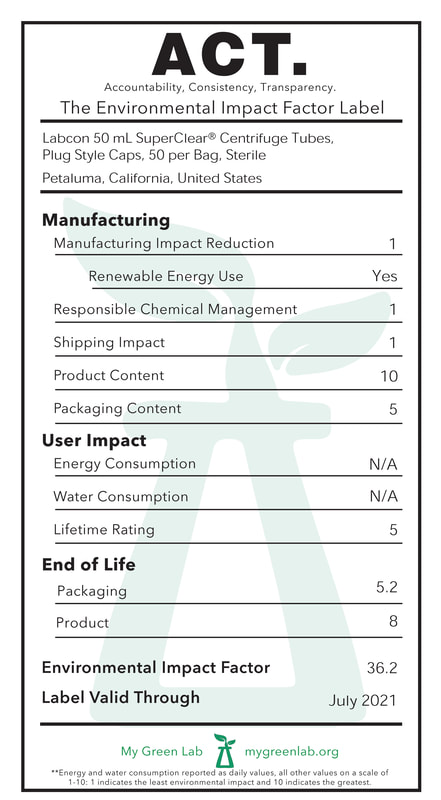Labcon 50 ml Superclear® centrifuge tubes, Plug style caps, 50 per bag, sterile, 3182-345-008-9
Additional Information about Labcon's 50 mL SuperClear® Centrifuge Tubes, Plug Style Caps, Sterile ACT Label
Manufacturing Impact Reduction
Labcon has made extensive efforts to reduce its energy, water and waste documented since 2008. Benchmarked to each case of product, Labcon shows a reduction in GHG emissions, water, energy, and waste since 2013.
Renewable Energy Use
Labcon has a large photovoltaic system to support and offset electricity from the grid to help produce its products. Output for the system can range anywhere from 800,000 kWh to up to 1.2 million kWh per year.
Responsible Chemical Management
Labcon has an internal policy and procedure to appropriately avoid employee exposure to hazardous chemistries. As part of the policy, hazardous chemistries are analyzed before they enter the manufacturing facility. Labcon’s products do not contain any mutagens, carcinogens, or reproductive toxins at 95% by weight.
Shipping Impact
Labcon's products are made in Petaluma, California in the United States.
Product Content
This product is made of virgin materials.
Packaging Content
The box that transports the products contains up to 46% recycled content by weight.
Energy Consumption
This product does not consume energy.
Water Consumption
This product does not consume water.
Lifetime Rating
Labcon’s tubes are made for one-time use. However, they have been tested to store samples for up to 4 years. While it is possible that the tubes may store samples longer than 4 years, this has not been tested or verified.
Packaging End-of-Life
Nearly 60% by weight of the packaging of this product is cardboard which is readily recyclable in over 60% of the US infrastructure. The LDPE bags are recyclable but not readily recyclable in every area. Labcon provides further education to customers on LDPE bags and the recyclability of these.
Product End-of-Life
Labcon's tubes are made from Polypropylene and the caps are made from Polyethylene. Both materials are recyclable in many infrastructures in the United States, but not all. Please be sure to follow your company's waste and recycling procedures regarding disposal of these products.
Labcon has made extensive efforts to reduce its energy, water and waste documented since 2008. Benchmarked to each case of product, Labcon shows a reduction in GHG emissions, water, energy, and waste since 2013.
Renewable Energy Use
Labcon has a large photovoltaic system to support and offset electricity from the grid to help produce its products. Output for the system can range anywhere from 800,000 kWh to up to 1.2 million kWh per year.
Responsible Chemical Management
Labcon has an internal policy and procedure to appropriately avoid employee exposure to hazardous chemistries. As part of the policy, hazardous chemistries are analyzed before they enter the manufacturing facility. Labcon’s products do not contain any mutagens, carcinogens, or reproductive toxins at 95% by weight.
Shipping Impact
Labcon's products are made in Petaluma, California in the United States.
Product Content
This product is made of virgin materials.
Packaging Content
The box that transports the products contains up to 46% recycled content by weight.
Energy Consumption
This product does not consume energy.
Water Consumption
This product does not consume water.
Lifetime Rating
Labcon’s tubes are made for one-time use. However, they have been tested to store samples for up to 4 years. While it is possible that the tubes may store samples longer than 4 years, this has not been tested or verified.
Packaging End-of-Life
Nearly 60% by weight of the packaging of this product is cardboard which is readily recyclable in over 60% of the US infrastructure. The LDPE bags are recyclable but not readily recyclable in every area. Labcon provides further education to customers on LDPE bags and the recyclability of these.
Product End-of-Life
Labcon's tubes are made from Polypropylene and the caps are made from Polyethylene. Both materials are recyclable in many infrastructures in the United States, but not all. Please be sure to follow your company's waste and recycling procedures regarding disposal of these products.

